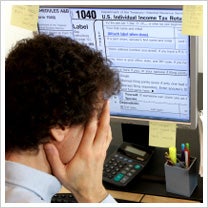Three Common Small-Business Tax Mistakes Failing to track expenses and take certain deductions can cost your business money.
By Karla Dennis
Opinions expressed by Entrepreneur contributors are their own.
 Many entrepreneurs feel the need to carry every responsibility for their business on their own shoulders. As a result, a surprising number of business owners file their own taxes. Perhaps not surprisingly, many of their filings contain avoidable mistakes. Here are three of the most common.
Many entrepreneurs feel the need to carry every responsibility for their business on their own shoulders. As a result, a surprising number of business owners file their own taxes. Perhaps not surprisingly, many of their filings contain avoidable mistakes. Here are three of the most common.
1. Poor record keeping. Don't rely on your memory alone. Sloppy record keeping is the most common problem among business owners, according to the Internal Revenue Service.
One particular area where business owners can go wrong is in using a personal credit card or cash for business purchases and failing to track those expenses. When tax season arrives, you might find yourself estimating your expenses only to arrive at a number that is either far above or below the reality. Remember, the IRS is looking for exact numbers, not ballpark figures.
Off-the-shelf accounting software can help you keep track of expenses. But if you know little about accounting, it's a good idea to consider working with an accountant who can help review your data entry periodically to help to ensure the accuracy of your numbers.
2. Misclassifying workers. It's common for business owners to use independent contractors or virtual assistants to help with projects and jobs. Many erroneously classify these costs as labor or payroll costs. They are then deducted on their tax returns as salaries and wages. However, costs that are classified as wages are subject to payroll taxes, meaning a business owner can be taxed 10 percent more than they should be. Independent contractors should be classified as outside services on the tax return. In addition, if the amount you pay an independent contractor exceeds $600 per year, you will need to file the appropriate 1099 forms.
The best way to determine the correct worker classification is to review the amount of control you have over their work. If you are controlling how and where the work is done and providing the tools to do it, then chances are good that are the worker is an employee. To make sure you're classifying a worker's status properly, consider reviewing it with a payroll-services provider or your tax accountant.
3. Late payments. Some business owners believe their tax payments are due when they file their tax returns April 15th. This is a common mistake. The tax system for businesses operates on a "pay as you go" schedule, and owners are expected to make quarterly estimated tax payments. The due dates are April 15, June 15, Sept. 15 and Jan. 15. Failing to make these payments may flag your return for audit, and trigger penalties and interest charges when you finally do file the tax return.
-- This post is an excerpt from Tax Storm (Panache Publishing, 2010) by Karla Dennis. Dennis is chief executive of Cohesive, a tax and accounting firm in Cypress, Calif.









